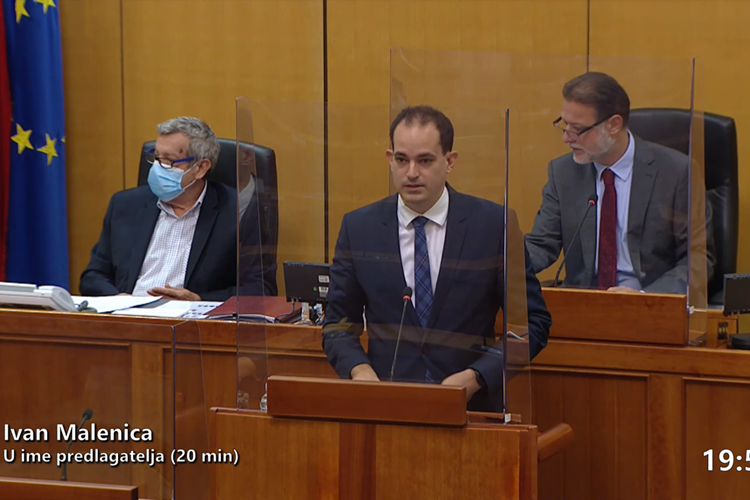- Published: 21.10.2021.
Minister Malenica presents the new Anti-Corruption Strategy 2021-2030 to Parliament
The new Anti-Corruption Strategy aims at strengthening existing anti-corruption mechanisms and creating new, systematic solutions to raise awareness of the harmful effects of corruption, insisting on stronger affirmation of citizens, civil society and media as indispensable partners of institutions in the fight against corruption.
The new strategic approach encompasses five special objectives: to strengthen the institutional and legislative framework for combating corruption, reinforce transparency and openness of the work of public authorities, strengthen the integrity system and conflict of interest management, boost the anti-corruption potential in the public procurement system, and to raise awareness about the harm caused by corruption, necessity of reporting regularities and strengthening transparency.95 anti-corruption measures are envisaged under the five objectives, in the fields of public administration, political system, justice, economy, management of state assets and public finances, agriculture, healthcare, science, culture, education, sports, environmental protection, energy, transport and infrastructure. The Strategy will be an umbrella document for 3 triannual Action Plans for the periods 2022-2024, 2025-2027 and 2028-2030.
Specifically, the Strategy strives towards reinforcing the integrity system and conflict of interest management on local, regional and central level, and apart from the normative regulation of the conflict of interest area, several additional measures are envisaged for the local level, e.g. more transparent appointments in companies and public institutions owned by local and regional self-government units, where the mechanisms of citizen participation on local level will be strengthened. It will also be specified in the law that all local and regional self-government units are obligated to adopt codes of ethics for local civil servants and appointed officials, and clear guidelines will be issued for the development of such codes of ethics to ensure equality of local governments. In addition, the obligation to report and publish business relationships of the members of local representative bodies will be introduced.
The Strategy clearly indicates the need to regulate lobbying for the purpose of transparency of work, more effective corruption risk management and a positive impact on the quality of regulations and decisions adopted by the legislative and executive branches of government. A Lobbying Act will be adopted, regulating lobbying as a legal and legitimate profession subject to the highest ethical standards. Moreover, the system for protecting reporters of irregularities i.e. whistleblowers will be strengthened, and educational activities aimed at strengthening the judicial protection of whistleblowers will be continued. There will be continuous trainings for trusted persons, trade union commissioners and civil servants on secure ways to report irregularities, the procedure of reporting irregularities to the People’s Ombudsman will be digitalised, and further steps made to raise awareness of whistleblowers' rights.
The Strategy envisages several measures contributing to the resilience of the justice system to corruption risks, including the enhancement of communication capacities of judicial officials and civil servants responsible for PR, measures to reinforce the integrity of judicial officials, enhancement of the capacities of and legislative framework for the work of the State Judicial Council and the State Attorneys’ Council, and improvement of the legislative framework to accelerate prosecution of corruption offences.
As regards public procurement, plans for the coming strategic period include strengthening of the institutional and legislative framework for public procurement, efficiency improvements and development of a comprehensive strategic approach to preventing and reducing corruption risks in public procurement.
Furthermore, additional steps and measures are envisaged to tackle corruption risks in healthcare, especially in the area of public awareness raising about the harmfulness of giving gifts to doctors. Also, the possibility of conflict of interests of medical practitioners who simultaneously hold jobs in public and private sector will be made more transparent.
Considering the perceived high percentage of negative public perception in the area of corruption, a special emphasis in the Strategy is placed on raising public awareness of the harmful effects of corruption, the functioning of existing anti-corruption mechanisms, the need to report corruption and to strengthen the role of citizens in synergistic anti-corruption activities.
The video of the Minister’s presentation of the Strategy, followed by Parliament discussion, is available at: https://www.youtube.com/watch?v=XTIsil5609s
